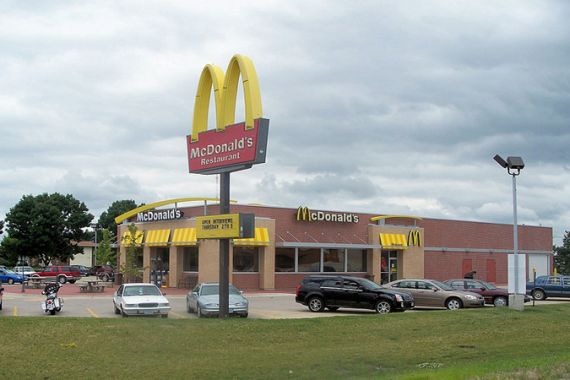McDuped: Why American fast food chains are exploiting their workers
Fast food conglomerates, like McDonald’s, do not give their workers a livable wage, writes author.

Around the United States, fast food workers have been striking and picketing, demanding a raise from $7.25 to $15 an hour, and the right to organise a union.
Many people are asking whether the companies can afford to do this. But the more urgent question is, can the workers afford the status quo?
Keep reading
list of 4 items‘Divest from Israel’: Decoding the Gaza protest call shaking US campuses
IMF promises Pakistan ‘immediate’ release of $1.1bn loan after key meet
Japan’s yen surges after sinking to lowest level against dollar since 1990
No.
Human beings in major cities simply can’t survive and raise families on $7.25 an hour, especially when employers can – and do – reduce workers’ hours whenever they choose, to save payroll costs or health insurance. Babies must have formula, children must have shoes, everyone must pay rent, buy food, and take medicine when they get sick. Many fast food workers families find that none of that is possible on their current wages.
|
|
| Inside Story Americas – Fast food: High profits and low wages |
By every measure, low wage workers are paid less now than they were from the 1950s-1970s. As economists at Center for Economic and Policy Research have shown, if the minimum wage had, since 1968, increased to keep pace with to the Consumer Price Index – the best measure of purchasing power – it would now be be $10.57, $3.50 higher than it is. The minumum wage is also disgracefully low compared to productivity levels; that means that workers are making money, they just aren’t being allowed to keep much of it.
So the question of whether fast food companies can afford to pay workers more is like asking whether slaveholders could afford to give up slavery – yes, it’s a pain to go from paying workers less to paying them a living wage. Bosses don’t like making that change. Some will go out of business, just as some plantations did after the Civil War. The same can be said of factories at the end of last century who were forced to give up child labor and observe safety laws: those were sometime expensive changes. But for the rest of society, such changes are good.
Some people have argued about where a raise to $15 could come from. Judging from McDonald’s annual report, a raise would minimally affect the company’s massive profits. Some commentators worry about struggling franchises, but the raise could also come out of the considerable (and fixed) royalty they pay to McDonald’s headquarters – not out of franchise owners’ take-home pay.
And some of the raise for the workers could come out of increases in the price of fast food.
Much has been made of the downside of raising prices on fast food meals, and it’s an obvious one: many fast food consumers are poor, and would feel even a small increase acutely.
But in the long run, increasing the pay of fast food workers raises the floor of the low-wage labour market. Other employers might have to pay more in order to compete with fast food companies and attract better workers, but in any case, the raise for fast food workers should be accompanied by policy measures to increase pay in all currently low-wage industries. This would givethe poorest workers in our economy more purchasing power, allowing them to pay more for a Big Mac – or for anything else.
That’s what happens in high-wage countries, where fast food workers earn much more. Rather than go out of business, McDonald’s finds ways to pay the workers. But also, patterns of consumption change when all workers are prospering. As The Atlantic reports , customers who make more expect more, so in Australia, where fast food workers do make $15/hour, consumers got espresso and McCafe way back in 1993.
A large body of economic research – from economists at the Economic Policy Institute, for example – shows that raising wages for poor workers benefits the whole economy by stimulating demand for goods and services. And why wouldn’t it? When people make more money, they are able to spend more – and that includes being able to pay a bit more for a Happy Meal.
For too long, we’ve accepted the idea that low prices are necessary so that poor consumers can enjoy some basic necessities and indulgences. We accept that low wages for some are simply an unfortunate but inevitable consequence. In this uninspiring vision – a reality for much of America – poor workers endure substandard living conditions to subsidize other poor workers’ consumption. But here’s a better idea: pay all workers enough to live decently and to buy the stuff they want and need.
And sometimes, they might even be able to eat a better restaurant than McDonald’s. But let’s not get ahead of ourselves.
Liza Featherstone is a public school parent in Brooklyn, New York. She’s also a contributing writer to The Nation, and writes on education for Newsday, the Brooklyn Rail and many other publications.
Follow her on Twitter: @lfeatherz
